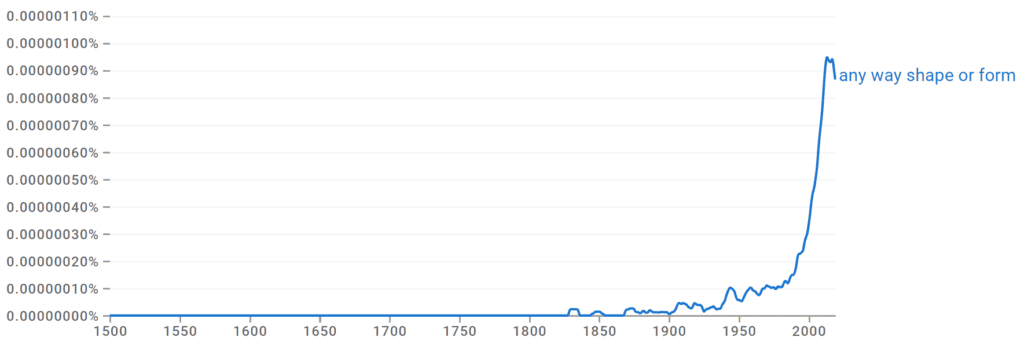The idiom in any way, shape, or form means in any possible manner, regardless of the method, appearance, or nature.
Imagine someone saying they don’t like pineapple in any way, shape, or form. It means they won’t touch the fruit, be it fresh, as a juice, in a pizza, or even as a decor on their Hawaiian shirt.
Idioms like this one are expressions whose meanings aren’t directly derived from the words they contain. Instead, they have a figurative sense. In the English language, idioms enrich communication by adding color, depth, and cultural context. They allow speakers to convey complex ideas or emotions succinctly and often with a touch of humor or local flavor.
My guide teaches you all about the meaning and origin of this idiom and shares some examples of how to use it in a sentence.
In Any Way, Shape, or Form Meaning

In any way, shape, or form is an idiom that emphasizes complete inclusivity or thoroughness, leaving no room for exceptions. When you use it, it highlights that there are absolutely no exceptions to the statement being made.
It’s like me with pickles. I hate them—the taste, the smell, even how they look. I refuse to eat them in any shape or form. Not even relish! Yuck!
How Do You Punctuate the Idiom In Any Way, Shape, or Form?
Ah, the Oxford comma, the punctuation world’s little diva! I love and swear by it, but it is a stylistic choice. The phrase in any way, shape, or form traditionally uses the Oxford comma before or, but it’s not strictly required. However, the comma does make the distinction between each item clearer.
- With Oxford comma: I don’t like seafood in any way, shape, or form.
- Without Oxford comma: He doesn’t involve himself in politics in any way, shape or form.
In Any Way, Shape, or Form Origin

The idiom in any way, shape, or form traces its roots back to the 19th century. While pinpointing its exact origin proves challenging, we understand its components. Each element—”way,” “shape,” and “form”—highlights different dimensions of variation or exception. Drawing from older English usage, like the 14th-century “in any wise” (meaning “in any manner”), the phrase has evolved to emphasize absolute comprehensiveness. Essentially, it’s a thorough way to convey complete exclusion or inclusion.
In Any Way, Shape, or Form Synonyms
- In every conceivable way
- By all means
- Wholly and utterly
- Through and through
- From head to toe
Examples of In Any Way, Shape, or Form in a Sentence

- Peter wasn’t involved in the scandal in any way, shape, or form.
- I simply refuse to eat Brussels sprouts in any way, shape, or form.
- Their new policy doesn’t support small businesses in any way, shape, or form, so I’m out.
- They share a last name, but she’s not related to the celebrity in any way, shape, or form.
- Their stupid software doesn’t benefit the end-user in any way, shape, or form.
- The manager stated that the company wouldn’t condone such behavior in any way, shape, or form.
- I won’t eat pickles in any way, shape, or form.
No Ifs, Ands, or Buts
Idioms breathe life into languages, offering vibrancy and depth. In any way, shape, or form is a testament to this, highlighting the beauty of English’s ability to convey robust ideas with just a few words. While its roots span centuries, its relevance remains unwavering today.
Whether you’re expressing a strong preference (like my aversion to pickles!) or emphasizing a point, this idiom gets the job done thoroughly. Dive deeper into the world of idioms, and you’ll discover a rich tapestry of expressions that paint colorful narratives in our everyday conversations.
Check out some others we covered:
